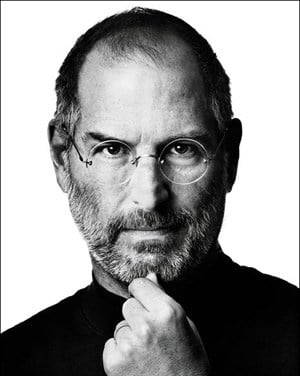 After Steve Jobs died, there were a few days when it seemed like every reporter on the New York Times payroll had been conscripted to write about the man. Encomia, reminiscences, and meditations filled page after page — at one point, the Jobsian deluge became so absurd that Nora Ephron parodied it, in a mock-solemn Times piece beginning with the sentence: "I, too, did not know Steve Jobs."
After Steve Jobs died, there were a few days when it seemed like every reporter on the New York Times payroll had been conscripted to write about the man. Encomia, reminiscences, and meditations filled page after page — at one point, the Jobsian deluge became so absurd that Nora Ephron parodied it, in a mock-solemn Times piece beginning with the sentence: "I, too, did not know Steve Jobs."
Now, the online Times has more-or-less simultaneously published three — three! — pieces about Walter Isaacson's official Steve Jobs bio, due Monday.
 Making the iBio For Apple's Genius: A straight-ahead review from Janet Maslin. It is ceaselessly adulatory, both of the book's author and its subject.
Making the iBio For Apple's Genius: A straight-ahead review from Janet Maslin. It is ceaselessly adulatory, both of the book's author and its subject.
As a biographer of Albert Einstein and Benjamin Franklin, Mr. Isaacson knows how to explicate and celebrate genius: revered, long-dead genius. But he wrote “Steve Jobs” as its subject was mortally ill, and that is a more painful and delicate challenge. (He had access to members of the Jobs family at a difficult time.) Mr. Jobs promised not to look over Mr. Isaacson's shoulder, and not to meddle with anything but the book's cover. (Boy, does it look great.) And he expressed approval that the book would not be entirely flattering. But his legacy was at stake. And there were awkward questions to be asked. At the end of the volume, Mr. Jobs answers the question “What drove me?” by discussing himself in the past tense.
… Mr. Isaacson takes his readers back to the time when laptops, desktops and windows were metaphors, not everyday realities. His book ticks off how each of the Apple innovations that we now take for granted first occurred to Mr. Jobs or his creative team. “Steve Jobs” means to be the authoritative book about those achievements …
 Steve Jobs Biography: A Scorecard of Put-Downs: A catalogue of the nasty things Jobs told his biographer about the broad range of people and institutions that bugged him. John Mayer makes the list, for some reason. So do Google, Microsoft, Intel, a former Apple exec, and Barack Obama:
Steve Jobs Biography: A Scorecard of Put-Downs: A catalogue of the nasty things Jobs told his biographer about the broad range of people and institutions that bugged him. John Mayer makes the list, for some reason. So do Google, Microsoft, Intel, a former Apple exec, and Barack Obama:
At a meeting with the president in 2010, Mr. Jobs told Mr. Obama bluntly that he was going to be a one-term president, Mr. Isaacson says, and that he needed to be more friendly to businesses. Mr. Jobs told Mr. Isaacson he was disappointed in Mr. Obama because the president did not want to offend anyone, a quality that Mr. Jobs conceded he lacked.
 Hints of Apple Plans In Jobs Book: Apparently, Jobs wanted to get into the textbook business.
Hints of Apple Plans In Jobs Book: Apparently, Jobs wanted to get into the textbook business.
If textbooks were given away free on iPads he thought the publishers could get around the state certification of textbooks. Mr. Isaacson said Mr. Jobs believed that states would struggle with a weak economy for at least a decade. “We can give them an opportunity to circumvent that whole process and save money,” he told Mr. Isaacson.
Skeptic after skeptic made the mistake of underrating Steve Jobs, and Mr. Isaacson records the howlers who misjudged an unrivaled career. “Sorry Steve, Here's Why Apple Stores Won't Work,” Business Week wrote in a 2001 headline. “The iPod will likely become a niche product,” a Harvard Business School professor said. “High tech could not be designed and sold as a consumer product,” Mr. Sculley said in 1987.
Mr. Jobs got the last laugh every time. “Steve Jobs” makes it all the sadder that his last laugh is over.



